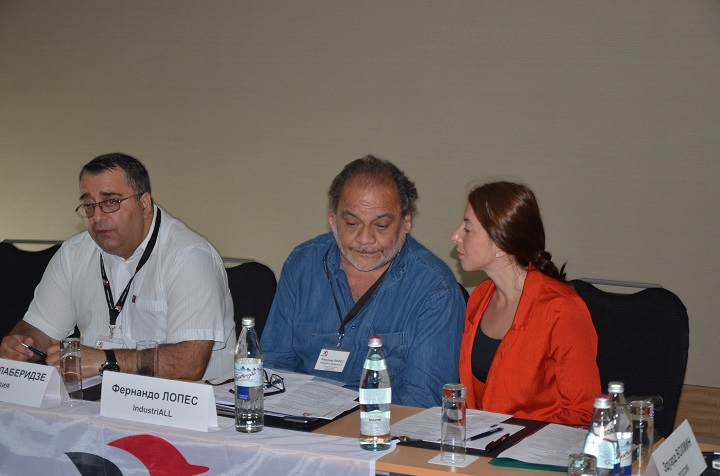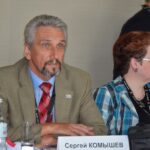15 June, 2015IndustriALL Global Union affiliates from Armenia, Azerbaijan, Georgia, Kazakhstan, Kyrgyzstan, Russia and Ukraine met in Batumi, Georgia on 4 and 5 June to discuss strategies to strengthen collective bargaining in the steel and mining industries.
Fernando Lopes, IndustriALL Assistant general secretary, reported on the global trends in the steel industry. According to forecasts based by leading steel companies, China remains the only country that is increasing metal manufacturing and consumption and is expected to show double growth by 2030. USA, which is the second biggest manufacturer, and Russia, the seventh, will both keep their positions between 2014 and 2030, but will slightly decrease their production volumes. The expected downturn is largely due to the use of new materials replacing metal, for instance, in the automobile sector and other industries.
Sergey Komyshev, Chairman of the Metallurgical and Mining Industry Workers Union of Ukraine (MMIWU), reported that the drop in metal production from 40 to 30 million tonnes per year was due to changes in the Ukrainian economy after the financial crisis of 2008-2010, as well as the military conflict in Donbas. He also spoke about the difficulties in relations with employers’ associations in the country. Multinational company employers are not in the employers’ association and therefore are not part of the sectoral collective bargaining agreement.
Participants paid special attention to precarious work, which is increasingly visible in the region. In the Ukraine, the use of precarious work is limited by the “Law on population’s employment”, which came into force on 1 January 2013. The law legalized triangular employment and necessitates a licence to recruit workers for another employer. For example, the regulation lead to the closure of the Azov Personnel Service employment agency that re-employed many workers at metallurgical enterprises. Toiling in sweltering workshops in dangerous conditions at enterprises, but officially employed through the Azov Personnel Service employment agency, these workers were deprived of the benefits they would have been entitled to if they had been employed directly by the enterprise. After the agency was closed, a few hundred workers were reinstated in their permanent jobs. However, it took a long time for the MMIWU to restore the history of their work tenure that they lost during their employment through the agency.
Andrey Shvedov, vice-chair of the Miners' & Metallurgical Workers' Union of Russia, said that Russia had adopted a law banning precarious work.
Assylbek Nuralin, Chairman of the Trade Union of Workers of Mining and Metallurgical Industry of the Republic of Kazakhstan, spoke about the difficulties they face while conducting negotiations at the sectoral level. The price of aluminium has dropped twice within the last five years, copper has decreased in value by one third, while iron ore has dropped by 40 per cent. Prices are now close to prime costs. At the same time the number of workers has decreased by more than a third in some industries, making it harder for unions to bargain with employers.
Eldar Tadzhibaev, Chairman of the Mining and Metallurgy Trade Union of Kyrgyzstan, spoke about the development of his union and the structural union reform stipulated in their statutes.
Tamaz Dolaberidze, Chairman of the Trade Union of Metallurgy, Mining and Chemical Industry Workers of Georgia, spoke about the pressure exerted on the unionized workers at the RMG Gold and RMG Copper enterprises. He also reported on the organizing project supported by the Norwegian union Industri Energi.
Participants at the meeting welcomed the decision of IndustriALL’s Executive Committee to accept the Branch Union of Trade Union Organizations of Miners, Metallurgists & Jewellers of Republic of Armenia (TUMMJRA) as a new affiliate, and Fernando Lopes handed over a flag of IndustriALL Global Union to the union delegation.










